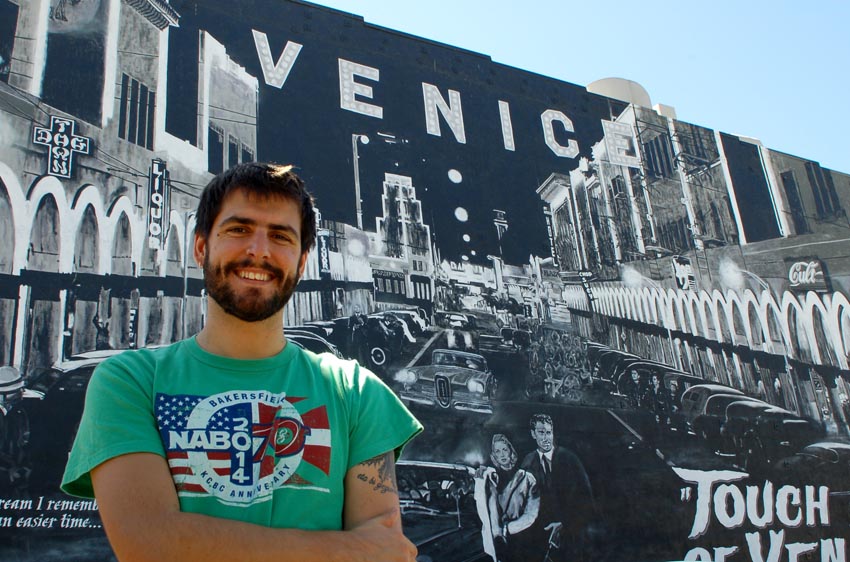Joseba Etxarri. After studying Information Technology at the University of the Basque Country, this man from Leioa who is 30 years old, worked as a journalist for a time, before he decided that it was a good moment to make an investment in himself. With this in mind he landed in California at the beginning of last year, looking for new opportunities and to gain new life experiences for both his personal and professional lives.
-Bakersfield was your point of entry in the United States.
-Going back a bit in time, three years ago, I decided to leave my contract as a journalist in Bilbao to do a Masters in Sociolinguistics in Vitoria-Gasteiz. Shortly afterwards, I found out that they were looking for a Basque language and culture teacher in Bakersfield at the Basque club and university levels, and so I applied. I was the lucky one chosen and so I considered this an excellent opportunity to carry out some sociolinguistic research on the Basques in the US and their relationship with the various languages they are in touch with. This is how I started; even though it didn’t take me long to miss journalism, so I started publishing some articles. Six months later, I found a job at a magazine in Los Angeles, and when that contract finished I continued to write daily as a freelancer, in Basque, Spanish and English, mainly for Basque Country media.
-Was it hard to get papers to work legally in the US?
-The unemployment rate is much lower here in comparison with what we have there, but when it increases it creates a complete political earthquake, and that has direct consequences on issuance of visas. It isn’t easy at all to get a work permit. In my case, I work as a foreign correspondent and I have a journalist’s visas; the money I make comes from abroad and I spend it here, so they haven’t imposed any special constraints.
-How’s your English?
I studied in the Basque Country and over the last 10 years I have been able to practice it during stays in England or Malta, at the University. In Bakersfield I taught in English. But it’s clear that managing with spoken English and the level of written English required to be a journalist are not the same. Journalists are linguistic references and so you have to be very fluent in the language, so that is where I am, working hard to improve my English level as much as I can.
-Is it expensive to live in Los Angeles?
-I would say so. I live in a small apartment and it’s not just a question of the house or prices in general, but for example, you have expenses that you don’t have in Europe, that are big like insurance, and doctor bills…that are really expensive. In regards to food, food is cheap, but if you want quality food it can be expensive.
-What is your relationship with Basques in the US?
-I met them face to face in 2010, when I came as a journalist to cover Lehendakari Patxi Lopez’s visit to the west. That allowed me to conduct some interviews with people like anthropologist William Douglass, founder of the Center for Basque Studies at the University of Nevada, Reno, about Basques here. When I got home, I stayed in touch with Pedro J. Oiarzabal, researcher at Deusto University and expert on the Basque Diaspora. So when I came to Bakersfield last year, those experiences, along with the people that I had met online, allowed me to come with some knowledge of North American Basques and have many friends and acquaintances already.
-What are they like?
-They are proud of the Basque Country and proud of being Basque. The strength of this sentiment amazes me, what they call “Basqueness” here. There is a unique way of being Basque that adds to the color of the Basque Country and enriches it. You have to recognize the contribution made by those here to the Basque world.
-In general what caught your attention in the United States?
-I really didn’t expect the Americans to be as different from Europeans as they are. You can really notice it in everyday exchanges and in the way their brains are organized. For example, it’s not easy to make friends here. Many times they call anything a “friend.” They meet someone on a weekend and on the following Monday they loan him/her their car, but after a few days maybe they won’t return phone calls. Relationships are often superficial and that is especially puzzling at first.
-When will we see you in the Basque Country?
-I’ve planned a visit for December. How long will I stay here? My goal is to feel comfortable writing in English normally. Then, I know that I have things to do in the Basque Country and my concerns are there, language and culture, political and social questions…






 Send to a friend
Send to a friend Add comment
Add comment








